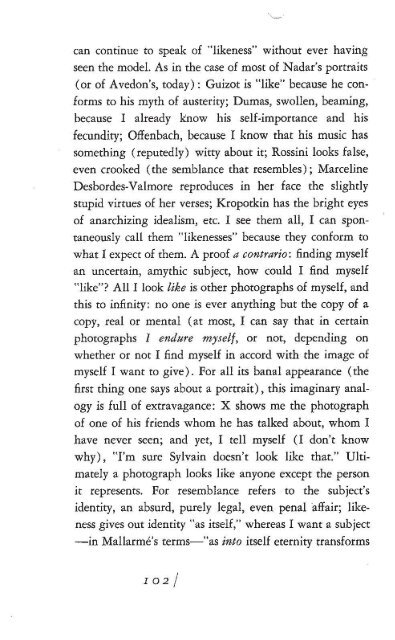Camera Lucida: Reflections on Photography - Monoskop
Camera Lucida: Reflections on Photography - Monoskop
Camera Lucida: Reflections on Photography - Monoskop
You also want an ePaper? Increase the reach of your titles
YUMPU automatically turns print PDFs into web optimized ePapers that Google loves.
can c<strong>on</strong>tinue to speak of "likeness" without ever having<br />
seen the model. As in the case of most of Nadar's portraits<br />
(or of Aved<strong>on</strong>'s, today): Guizot is "like" because he c<strong>on</strong>forms<br />
to his myth of austerity; Dumas, swollen, beaming,<br />
because I already know his self-importance and his<br />
fecundity; Offenbach, because I know that his music has<br />
something (reputedly) witty about it; Rossini looks false,<br />
even crooked (the semblance that resembles) ; Marceline<br />
Desbordes-Valmore reproduces in her face the slightly<br />
stupid virtues of her verses; Kropotkin has the bright eyes<br />
of anarchizing idealism, etc. I see them all, I can sp<strong>on</strong>taneously<br />
call them "likenesses" because they c<strong>on</strong>form to<br />
what I expect of them. A proof a c<strong>on</strong>trario: finding myself<br />
an uncertain, amythic subject, how could I find myself<br />
"like"? All I look like is other photographs of myself, and<br />
this to infinity: no <strong>on</strong>e is ever anything but the copy of a<br />
copy, real or mental (at most, I can say that in certain<br />
photographs I endure myself, or not, depending <strong>on</strong><br />
whether or not I find myself in accord with the image of<br />
myself I want to give). For all its banal appearance (the<br />
first thing <strong>on</strong>e says about a portrait), this imaginary analogy<br />
is full of extravagance: X shows me the photograph<br />
of <strong>on</strong>e of his friends whom he has talked about, whom I<br />
have never seen; and yet, I tell myself (I d<strong>on</strong>'t know<br />
why), "''m sure Sylvain doesn't look like that." Ultimately<br />
a photograph looks like any<strong>on</strong>e except the pers<strong>on</strong><br />
it represents. For resemblance refers to the subject's<br />
identity, an absurd, purely legal, even penal affair; likeness<br />
gives out identity "as itself," whereas I want a subject<br />
-in Mallarme's terms-"as into itself eternity transforms

















